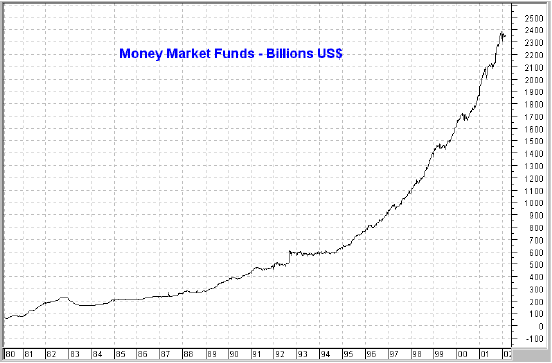Quote:
Originally Posted by Baraka_Guru

What are you talking about exactly? Liberal government?
Isn't Warren Buffett a liberal?
|
Currently people are sitting on a lot of cash in low interest instruments. When the cash starts to be put in the stock market, some expect stock prices it to rise. Currently, there is also a trend for large "hedge fund type" investments taking cash out of the market due to liquidity needs- once this stabilizes the market should also have this in its favor as well. I think many are sitting in "cash" is because of pessimism. I would like to see an Obama bounce, but we need optimistic people to start believing in the strength of the economy.
Some believe the assumptions that support my view are invalid, so do your own homework before following any "tips". The information below is a few years old, but may be relevant to those interested in the issue.

Quote:
One of the arguments often put forward for a substantial stock market rally is that there is a huge amount of cash on the sidelines. In other words, there is a lot of money sitting in interest-bearing accounts, earning less than 2% per year, that is eventually going to flood into the stock market in search of better returns and drive stock prices much higher. The big assumptions here are that 1) people will, indeed, decide to choose a riskier asset over cash, and 2) that the assets they choose will be stocks or mutual funds.
The Japanese experience over the past 12 years has proven that the first assumption is, under certain conditions, invalid. The majority of people sometimes do prefer to keep their funds in an interest-bearing account, even if the interest rate is almost zero. But what are those conditions under which cash will be the investment of choice? Quite simply, when the prices of the main alternatives to cash are in long-term downtrends. This is because a rising price stimulates investment demand, not the other way around. If the price of any alternative to cash appears to be on a downward path then that alternative will not be an attractive option for the holder of cash. As prices fall around him the holder of cash sees the relative value of his cash increase, so the fact that he might be getting paid an interest rate close to zero is irrelevant.
The second assumption - that someone who is eager to invest his or her cash in a riskier asset class will choose the stock market - is invalid for the same reason that the first assumption is invalid. The stock market will only be the preferred alternative to cash if stock prices are trending higher. If the major stock indices are perceived to be trendless or in long-term downtrends, the 'cash on the sidelines' will not find its way into the stock market. The vast majority of people only consider buying an investment after they are convinced that the price is trending higher and they only become convinced after prices have already moved substantially higher.
|
Speculative-Investor.com
-----Added 6/11/2008 at 11 : 48 : 03-----
Quote:
Originally Posted by dc_dux

One of the striking results of the CNN exit poll:
Voters of $200,000 income and more:
Obama - 52%, McCain - 46%
No recent Democrat has ever won the upper income voters
Local Exit Polls - Election Center 2008 - Elections & Politics from CNN.com
Exit polls arent the best predictors..but if its evrn close to being right on the money, they certaintly werent scared away by Obama's plan to end Bush's tax holiday for the top income group.
BTW, his 43% showing among white voters was also the highest for a Democrat in more than 30 years. |
First Obama won the election. Second the $200,000 plus category can be segmented in many ways, one being those who earn income from assets and those who earn income from employment. To give meaning to the number we have to take a more detailed look. Also, further down the page on the link you provided showed a 49% tie between Obama and McCain in the $100,000 and up income category. What does that tell you relative to the data you highlighted.